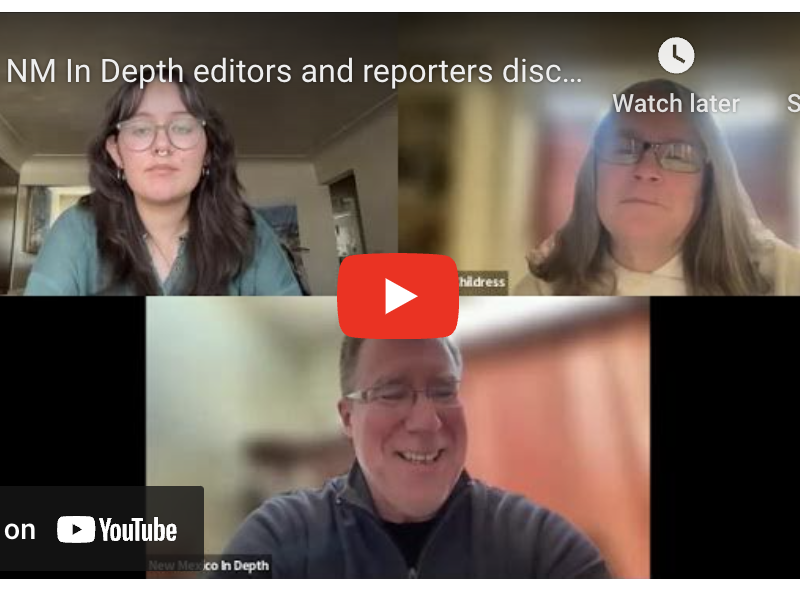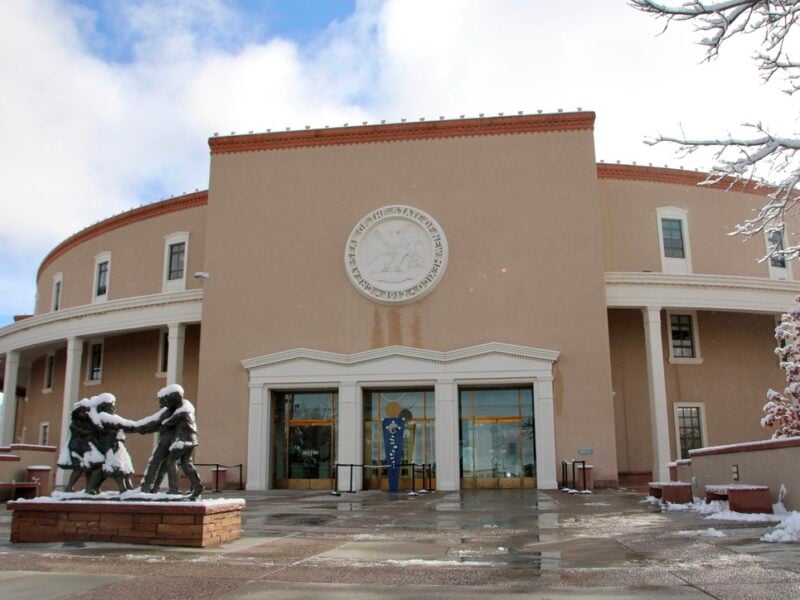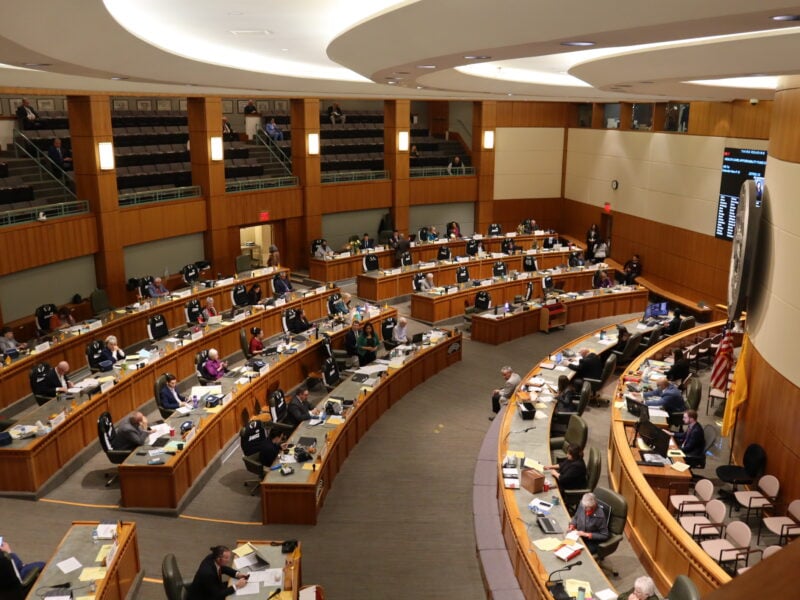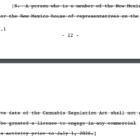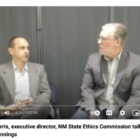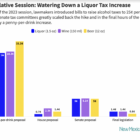This is one of New Mexico In Depth’s mid-week newsletter. We think it’s crucial to stay in touch and tell you what’s on our minds every week. Please let us know what’s on your mind as well. Or, got tips? What do we need to know?
Ethics
Bill would amend current law to allow lawmakers into cannabis biz early
|
Back in 2021, before voting to make recreational use of cannabis legal, lawmakers on the Senate floor barred any lawmaker serving at that time from getting a commercial cannabis license until 2026. Lawmakers debating the provision that year brought up potential conflicts of interest among voting lawmakers who might have plans to participate in a future cannabis industry.
Now, lawmakers have removed that prohibition in a bill that is making its way through the Senate. The Senate Judiciary committee last week created a substitute bill that included the change.
Senate Bill 6 contains numerous changes to the cannabis regulation act, which its sponsor, Sen. Katy Duhigg, said stem from lessons learned in the almost three years cannabis has been legal in New Mexico. Duhigg said she was carrying it on behalf of the agency that regulates cannabis companies.
The original bill this year kept the prohibition on lawmakers who voted on legalization in 2021 from getting into the cannabis business until 2026. Lawmakers on the judiciary committee discussed several changes to the bill, including one that would outlaw cannabis sales through drive-up windows, but skipped right over the change allowing them to open cannabis businesses two years early.
The bill later in the week passed the Senate Finance committee, where Sen. Jeff Steinborn, D-Las Cruces, questioned why the prohibition was removed.
Ethics
NM In Depth editors and reporters discuss government transparency, ethics and the Governmental Conduct Act
|
New Mexico In Depth editors held the third of five online chats about the 2024 legislative session last week. Professor of Practice of Journalism at the University of New Mexico, and occasional contributor to New Mexico In Depth, Gwyneth Doland, joined Executive Director Trip Jennings and Managing Editor Marjorie Childress to discuss government transparency, legislative modernization efforts, and the Governmental Conduct Act. Doland kicked off the conversation talking about the 14 students she takes to the Roundhouse every Wednesday and their experience thus far. “It’s interesting and cool to see things through their eyes,” she said, while noting that for newcomers, navigating the state capitol during a legislative session can be a lot to take in.
The three discussed efforts over the past 15 years to make the statehouse more accessible and understandable, including webcasting, budget transparency efforts, and showing what is stricken or added through amendments lawmakers adopt to change legislation, and making bills easier to track. One step backwards Jennings mentioned is that certain areas of the capitol have been closed to the public, making it more difficult to reach lawmakers for a conversation.
Environment
Oil and gas gave big in 2023. The industry flexed its muscles this week.
|
Large oil and gas companies gave nearly $800,000 in the past 12 months to Gov. Michelle Lujan Grisham, partisan legislative political action committees and individual state lawmakers, according to a partial review of campaign finance reports filed by lobbyists. That amount almost certainly will grow in coming months due to a quirk in New Mexico’s disclosure laws. Elected officials don’t have to report contributions they received in the last quarter of last year until this spring.
The amount of money the industry showers on elected officials offers a glimpse into the influence it has at the state capitol during legislative sessions.
The industry’s ability to shape legislation was on full display Thursday when a House committee substantively stripped a bill of new regulations that would have required oil and gas infrastructure to be set back more than a third of a mile from schools, health facilities, multifamily housing, occupied homes, and at least 300 feet from waterways.The political giving reflects the industry’s outsized dominance in a state that ranks second in oil production nationally and where more than 40% of funding for New Mexico’s state budget can be tied directly to the industry.The money spread around to New Mexico’s elected officials has been well-documented, as has its power. A March 2020 report by Common Cause New Mexico and New Mexico Ethics Watch detailed the largess over the years 2017-2019, with almost $12 million funneled into political campaign coffers, and more than a million more was given by October of that year.New Mexico In Depth also has documented the political spending and the push and pull over regulation through the years. In 2019, the first year Lujan Grisham took over as governor from Republican Gov. Susana Martinez, there was a push by environmentalists to implement greater regulations for the oil and gas industry, but in the end, the oil and gas industry had little to fear.
The industry far exceeds other industries in its political giving, and has for many years.
Money in Politics
New Mexico In Depth editors chat about the state budget, public safety, and transparency
|
New Mexico In Depth editors held the first of five online chats about the 2024 legislative session yesterday. In a wide-ranging conversation, Executive Director Trip Jennings and Managing Editor Marjorie Childress covered the highlights of the first week, including Gov. Michelle Lujan Grisham’s State of the State address which was disrupted by young protestors on three different occasions. New Mexico In Depth will host weekly conversations each Thursday at 12:30 during the 30-day legislative session that kicked off on Tuesday.
Jennings and Childress, with 30 years or more combined reporting at the Roundhouse, discussed the competing state budget proposals from Lujan Grisham and the Legislature at a time when New Mexico is swimming in money thanks to a historic surplus. A theme of the coming budget discussions between the governor and state lawmakers will center on how much to spend and how much to save, they said. New Mexico relies heavily on the volatile oil and gas industry to pay for services and programs, with more than 40% of the state’s spending every year underwritten by revenues generated by the industry.
Money in Politics
Public blind to money flowing to lawmakers as session kicks off
|
As the New Mexico legislative session kicked off this week, the public was blind in one very important respect.
Marjorie Childress, New Mexico In Depth
In the next four weeks, lawmakers will create a state budget worth at least $10 billion dollars, pass another quite large capital outlay budget, and pass influential tax and policy bills. But who gave money to those lawmakers in the last quarter of the year – in the form of campaign contributions – will largely be a mystery. That’s because lawmakers aren’t required to file a public report in January about campaign contributions they received in the run-up to the legislative session, if they didn’t run for office the year before.
Since no lawmakers ran for office in 2023, we do not have a comprehensive data set showing the money that flowed into campaign accounts in the final months of 2023. Their last reports reflect contributions through Oct. 7, 2023, and we won’t have an update until April, when their next reports are due.I’ve been looking at campaign filings for many years. I promise you that among year-end contributors will be corporations and often, their owners and employees. There will be executives and public relations specialists for trade associations, labor unions, and public policy organizations.
Some of those contributors will be registered as official lobbyists for their organizations, and in those cases we can see what they gave because lobbyists must file a January report. But while the reports of 100 or so lobbyists, or of their employers, are highly consequential, they are just a slice of the money flowing into the campaign accounts of lawmakers. A fuller picture would allow the public to comb through reports by address, employers, and occupation, and better understand how much money lawmakers are getting from a particular industry, special interest group, or simply from a handful of big donors. Last year, lawmakers were poised to pass a bill with several transparency measures, including one that would have shifted the reporting schedule to capture donations at the end of the year in a January report, showing how much money was given to lawmakers in the run-up to the legislative session.
Ethics
Talking ethics with New Mexico Ethics Commission director, Jeremy Farris
|
State ethics officials grapple with a paradox in their daily work, said Jeremy Farris, executive director of the New Mexico State Ethics Commission. On the one hand, the heart of their work is designed to ensure the public knows that elected officials and government workers are held accountable in how they use the powers and resources entrusted to them. Why? Because those powers and resources belong to the people, not individuals holding public positions. This is one of two “big ideas” that motivate the commission, Farris said. The commission does that work by enforcing state ethics laws through investigations and in some cases, suing people.
Money in Politics
ICYMI: The State Ethics Commission squashed move by Lujan Grisham. Here’s why it matters.
|
This is an example of New Mexico In Depth’s mid-week newsletter. We think it’s crucial to stay in touch and tell you what’s on our minds every week. Please let us know what’s on your mind as well. Or, got tips? What do we need to know?
Alcohol
Lawmakers water down alcohol proposals amid public health crisis
|
ALBUQUERQUE, NEW MEXICO – JUNE 26, 2022: The alcohol department at a grocery store Albuquerque, NM on June 26, 2022. CREDIT: Adria Malcolm for New Mexico In Depth
The alcohol industry notched a victory Saturday as the Legislature approved an alcohol tax hike of less than a penny-a-drink on beer and hardly more than that for liquor and wine, a fraction of the 18- to 20-cents public health advocates pushed for in this year’s session.
Lawmakers also rejected a $5 million request from the Department of Health for a new Office of Alcohol Prevention, despite the state’s historic budget surplus. A DOH spokesperson said its epidemiology division would create a smaller version of the office anyway, using an additional $2 million lawmakers added to the agency’s budget.
Public health experts say the tax increase is so small that it’s unlikely to have any effect on excess drinking, let alone tackle New Mexico’s worst–in-the-nation rate of alcohol-related deaths. The chair of the House tax committee, Rep. Derrick Lente, D-Sandia Pueblo, who had rejected a compromise 5¢-per-drink proposal passed by his counterparts in the Senate, acknowledged the final increase was minor on the floor of the House of Representatives on Saturday morning. “If we want to call it minimal, we can call it minimal,” he said.
Money in Politics
House kills effort to increase campaign sunshine and prevent corruption
|
The New Mexico House of Representatives rejected a package of reforms to the state’s Campaign Reporting Act that would have closed a loophole allowing independent groups to evade reporting their donors.
Senate Bill 42, sponsored by Senate Majority Leader Peter Wirth, D-Santa Fe, Sen. Katy Duhigg, D-Albuquerque, and Rep. Matthew McQueen, D-Galisteo, would have fixed language in the law that a nonprofit organization exploited in 2020 to get around disclosing who gave hundreds of thousands of dollars to pay for political advertising in support of a ballot referendum on converting the Public Regulation Commission from an elected to an appointed body.
Eleven Democrats joined all Republicans to kill the bill.
Eleven House Democrats joined all Republicans to defeat Senate Bill 42 on March 15, 2023. Image from the House of Representatives vote tally board. “I’m very disappointed that members of my own party joined all of the Republicans to prevent the public from knowing who is paying for, among other things, political attack ads,” McQueen said after the vote.
Other reforms in the package included changes to ensure candidates don’t charge interest on personal loans they make to their own campaign accounts, thereby profiting from campaign contributions used to pay off such loans.
It would have changed reporting dates to provide more timely information about contributors to their campaigns. Currently, the public is in the dark for months about who gives money to campaigns on election day, or in the months preceding the legislative session in non-election years.
The bill also would have barred lawmakers from accepting contributions from lobbyists or political committees during the legislative session.
During the floor debate on the bill, McQueen fielded a wide range of questions, many of them about existing provisions under the Campaign Reporting Act that wouldn’t have been changed under Senate Bill 42. Numerous questions were fielded about provisions related to personal loans made by candidates to their own campaign accounts.
Money in Politics
Money in politics transparency nears finish as legislative session winds down
|
An effort to close a significant loophole in New Mexico’s campaign disclosure laws and bar campaign contributions from lobbyists and political committees to lawmakers during legislative sessions has a tailwind heading into the final week of the legislative session.
And at a key committee Monday night before heading to the House floor, lawmakers added new provisions to Senate Bill 42 to give the public more timely information about who is giving to campaigns. Those additions come from a bill sponsored by Rep. Matthew McQueen, D-Galisteo, that’s unlikely to clear the Legislature, having passed the House but not the Senate with five days left in the legislative session.
The newly combined bill, sponsored by Sen. Majority Leader Peter Wirth, D-Santa Fe, Sen. Katy Duhigg, D-Albuquerque, and McQueen, adds new requirements to prevent tactics used by a nonprofit group in 2020 to avoid disclosing who contributed hundreds of thousands of dollars to support a ballot referendum on converting the Public Regulation Commission from an elected to an appointed body.
The non-profit argued it followed the letter of the law by not disclosing contributors who put in writing that their money should not be used for politics, even though the nonprofit spent that money on the ballot measure. The measure the nonprofit campaigned for passed but the public still doesn’t know who was behind their deluge of advertising.
Senate bill 42 would change the letter of the law, requiring groups such as the nonprofit that spent on the 2020 campaign that want to avoid disclosing certain donors to deposit those contributions in a separate bank account that isn’t used to pay for political activity.
The bill also bars lawmakers, the governor and other statewide elected officials from accepting donations from lobbyists or political committees during the legislative session.
The bill would require candidates who loan their own money to their political campaigns to offer proof they actually made the loan, and they wouldn’t be allowed to charge interest on the loan. Candidates often loan their campaigns money, especially when running for office for the first time, and can later pay the loan back from future campaign contributions. This provision would prevent a scenario in which a candidate made money off interest on a loan they carried on their books over many years.
New additions to Senate bill 42 from McQueen’s other bill, House Bill 103, would require more timely reporting of campaign contributions so the public has more complete information just before elections and just before the legislative session each year.


